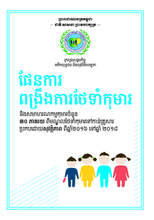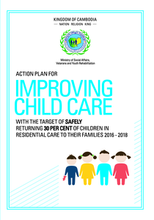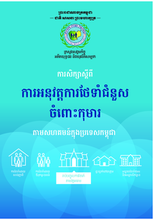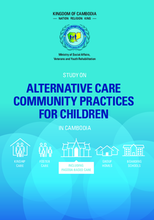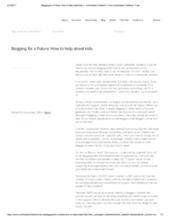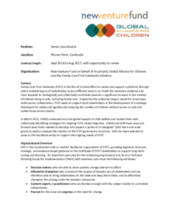This country page features an interactive, icon-based data dashboard providing a national-level overview of the status of children’s care and care reform efforts (a “Country Care Snapshot”), along with a list of resources and organizations in the country.
demographic_data
childrens_living_arrangement
children_living_without_bio
social_work_force
key_stakeholders
Key Stakeholders
Add New DataOther Relevant Reforms
Add New Datadrivers_of_institutionalisation
Drivers of Institutionaliziation
Add New Datakey_research_and_information
Key Data Sources
Add New DataMapping of residential care facilities in the capital and 24 provinces of the kingdom of Cambodia
National estimation of children in residential care institutions in Cambodia: A modelling study
Prevalence and number of children living in institutional care: global, regional, and country estimates
Shaping the national social protection strategy in Cambodia: Global influence and national ownership
Towards a Social Protection Strategy for the Poor and Vulnerable: Outcomes of the consultation process
Country Care Profile: Cambodia
Acknowledgements
Data for this country care snapshot was contributed by partners at Family Care First and UNICEF Cambodia.
Displaying 161 - 170 of 285
This Action Plan for improving child care, with the target of safely returning 30 per cent of children in residential care to their families 2016 - 2018, was developed to support the implementation of the Ministry of Social Affairs, Veterans and Youth Rehabilitation (MoSVY) Work Platform 2014–2018 and the Sub-Decree 119 on the Management of Residential Care Institutions, which was endorsed on 11 September 2015.
This Action Plan for improving child care, with the target of safely returning 30 per cent of children in residential care to their families 2016 - 2018, was developed to support the implementation of the Ministry of Social Affairs, Veterans and Youth Rehabilitation (MoSVY) Work Platform 2014–2018 and the Sub-Decree 119 on the Management of Residential Care Institutions, which was endorsed on 11 September 2015.
The ‘Study on Alternative Care Community Practices for Children in Cambodia, including Pagoda-based care’ (published in Khmer) is the first of its kind which sheds light on how different forms of alternative care are being used in the community.
This study commissioned by the Ministry of Social Affairs, Veterans and Youth Rehabilitation of the Kingdom of Cambodia and UNICEF Cambodia sheds light on how different forms of alternative care are being used in the community.
Australian nurse and surrogacy broker Tammy Davis-Charles has been arrested and is awaiting trail in Phnom Penh, Cambodia on charges related to engaging in surrogacy and falsifying documents.
A blog post from Cambodian Children's Trust pointing out the best way to help children begging on the street is to support children's organizations that support children and families in need.
UNICEF is seeking a consultant to contribute to the UNICEF Cambodia Child Protection Programme with a particular focus on supporting the Child Protection team
The Global Alliance for Children (GAC) is seeking to hire a vibrant Senior Coordinator to lead GAC’s work with the Technical Working Group Implementation.
This article and video discuss how thousands of Australians consider visiting orphanages to be a popular activity to do on vacation. Vacationers will visit orphanages, meet children, and take photos. The visit usually ends with a request for donations. Some believe that they are positively contributing to improvement of these children’s lives.
According to the article, the ChildSafe Movement has now “revamped” its company certification, which recognizes tourism companies for their dedication to child protection and commitment to ChildSafe’s 7 Standards by granting them a “ChildSafe Certification.”

